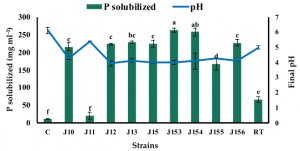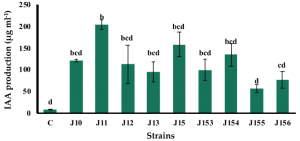A group from Mohammed VI Polytechnic University (UM6P), Benguerir, Morocco, etc. has reported on Phosphate solubilizing rhizobacteria stimulating wheat germination rate and seedlings growth.
https://peerj.com/articles/11583/
Recently, rhizosphere is attracting so much attention. Rhizosphere is very much like the relationship between intestine and intestinal bacteria. Intestinal endothelium corresponds to root epithelium, and intestinal bacteria correspond to soil bacteria. However, there have been few researches on rhizosphere glycome, and blog admin is watching the progress in this field with great interests as a new frontier.
Phosphorus (P) is considered one of the most important elements in plant nutrition after nitrogen. It is an essential macronutrient to all major metabolic processes in plants growth e.g., photosynthesis, energy transfer, respiration, and signal transduction. Phosphate solubilizing microorganisms including bacteria play an important role in enhancing soil fertility and plant growth. Therefore, it is paramount to explore management strategies which are considered as an environmentally friendly process and economically feasible procedure to improve crop production and maximize their yields in P-poor soils. Exploration of the biodiversity of rhizobacteria and the optimization/manipulation of microbial interactions in the rhizosphere represents an imperative step towards formulating more efficient microbial inoculants with high P-solubilizing ability. Although P is plentiful in soils in both organic and inorganic forms, it is in unavailable forms for root uptake. Numerous soil microorganisms particularly those present in plant’s rhizosphere can release the bound forms of P to a soluble form to increase its bioavailability to plants. Phosphate solubilizing bacteria belong to plant growth promoting rhizobacteria and are capable of solubilizing inorganic P from a variety of sources, such as dicalcium phosphate, tricalcium phosphate, or rock phosphate.
Bacteria screening identified nine best phosphate solubilizing strains as follows,

Indole acetic acid (IAA) stimulates plant growth,

Ammonia is a chemical compound having indirect plant health benefits, primarily by acting as metabolic inhibitor against phytopathogens. All tested strains were able to produce ammonia with various concentrations. The best one was Pseudomonas sp. J153.
As a conclusion, inoculation with P. moraviensis J12 and B. cereus J156 promote the highest rate of wheat seeds germination and seedlings growth.
